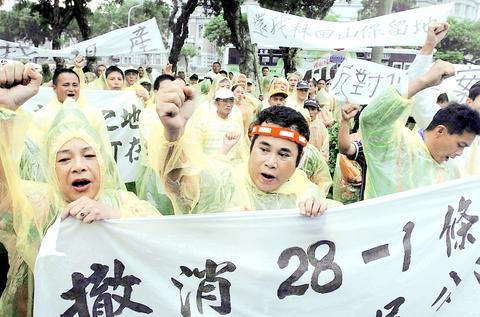An Aboriginal protest yesterday seemingly prevented a Ministry of the Interior (MOI) meeting scheduled for Tuesday from ratifying crucial changes to a law guaranteeing Aboriginal ownership and use of Aboriginal reservation land.
Led by Aboriginal independent Legislator May Chin (

PHOTO: CHIANG YING-YING, TAIPEI TIMES
The meeting, now canceled, had been expected to approve revisions to the Mountain Slope and Conservation Law (山坡地保育利用條例) proposed by the Promotion of Rights of Plains People Living in Mountain Districts, or Pingquanhui (平權會) for short, and certain Aboriginal groups in February. The revisions sought to give non-Aboriginal people illegally using or living on reservation land prior to 1995 rights equal to those of Aboriginal people.
The Pingquanhui has used virulently racist language to attack Aboriginal people, and has attempted to discredit Aboriginal claims to traditional lands by ridiculing the historical origins of Aboriginal people.
In Section 37 of the law, Aboriginal people who cultivate land within reservation zones for five years are guaranteed cultivation rights, land surface rights and lease rights to that land. The section also states: "Land ownership transfer is limited to Aboriginal people."
During the rally, Chin met with Vice Minister of the Interior Lin Join-sane (林中森), who promised not to proceed with the revisions without the full support of Chin and other Aboriginal representatives.
Earlier, Chin held a public hearing where she and other Aboriginal legislators denounced the attempt to implement the revisions.
"The MOI's actions clearly violate the Mountain Slope and Conservation Law. Although the revision obviously falls outside the limits set by the law, the MOI is using its power to manipulate the situation," she said.
Chin and the other Aboriginal representatives questioned the integrity of President Chen Shui-bian's (陳水扁) administration.
"The MOI's actions make me wonder: Is the government challenging the rights of Aboriginal people?" she asked.
"In 2000, Chen signed an agreement to respect the rights of Aboriginal people and help us regain our lands. However, this revision is plainly against the spirit of that agreement. It contradicts his promise to us," she said.
An editorial published in yesterday's China Times by Pu Chung-cheng (
Many "plains people" (non-Aboriginal people, ie, Han people) have lived in mountainous and rural areas traditionally seen as Aboriginal territory for several generations, and likewise for Aboriginal people living in the plains, he said, with both groups having developed social and economic ties in those areas.
However, Pu said, much of the land set aside as Aboriginal reservation land has been and is being illegally used by plains people or has been illegally sold to them by Aboriginal people through deception or because of serious financial need.
The government, he said, needed to do more to actively restore this land to Aboriginal people.

The Taoyuan Flight Attendants’ Union yesterday vowed to protest at the EVA Air Marathon on Sunday next week should EVA Airway Corp’s management continue to ignore the union’s petition to change rules on employees’ leave of absence system, after a flight attendant reportedly died after working on a long-haul flight while ill. The case has generated public discussion over whether taking personal or sick leave should affect a worker’s performance review. Several union members yesterday protested at the Legislative Yuan, holding white flowers and placards, while shouting: “Life is priceless; requesting leave is not a crime.” “The union is scheduled to meet with

‘UNITED FRONT’ RHETORIC: China’s TAO also plans to hold weekly, instead of biweekly, news conferences because it wants to control the cross-strait discourse, an expert said China’s plan to expand its single-entry visa-on-arrival service to Taiwanese would be of limited interest to Taiwanese and is a feeble attempt by Chinese administrators to demonstrate that they are doing something, the Mainland Affairs Council said yesterday. China’s Taiwan Affairs Office (TAO) spokesman Chen Binhua (陳斌華) said the program aims to facilitate travel to China for Taiwanese compatriots, regardless of whether they are arriving via direct flights or are entering mainland China through Hong Kong, Macau or other countries, and they would be able to apply for a single-entry visa-on-arrival at all eligible entry points in China. The policy aims

Taipei, New Taipei City, Keelung and Taoyuan would issue a decision at 8pm on whether to cancel work and school tomorrow due to forecasted heavy rain, Keelung Mayor Hsieh Kuo-liang (謝國樑) said today. Hsieh told reporters that absent some pressing reason, the four northern cities would announce the decision jointly at 8pm. Keelung is expected to receive between 300mm and 490mm of rain in the period from 2pm today through 2pm tomorrow, Central Weather Administration data showed. Keelung City Government regulations stipulate that school and work can be canceled if rain totals in mountainous or low-elevation areas are forecast to exceed 350mm in

EVA Airways president Sun Chia-ming (孫嘉明) and other senior executives yesterday bowed in apology over the death of a flight attendant, saying the company has begun improving its health-reporting, review and work coordination mechanisms. “We promise to handle this matter with the utmost responsibility to ensure safer and healthier working conditions for all EVA Air employees,” Sun said. The flight attendant, a woman surnamed Sun (孫), died on Friday last week of undisclosed causes shortly after returning from a work assignment in Milan, Italy, the airline said. Chinese-language media reported that the woman fell ill working on a Taipei-to-Milan flight on Sept. 22